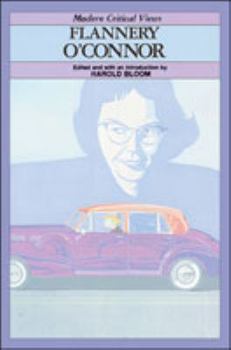Flannery O'Connor
(Part of the Bloom's Modern Critical Views Series and Bloom's Major Short Story Writers Series)
Select Format
Select Condition 
Book Overview
-- User's guide -- Biography of the short story writer -- List of characters in each story -- Detailed thematic analysis of each short story -- Extracts from major critical essays that discuss... This description may be from another edition of this product.
Format:Hardcover
Language:English
ISBN:0877546320
ISBN13:9780877546320
Release Date:January 1986
Publisher:Chelsea House Publications
Length:162 Pages
Weight:1.45 lbs.
Dimensions:0.8" x 6.4" x 9.5"
Customer Reviews
3 ratings
Understanding Flannery O'Connor's Genius
Published by Thriftbooks.com User , 15 years ago
The Harold Bloom edited MODERN CRITICAL VIEWS: FLANNERY O'CONNOR is a collection of critical essays dissecting O'Connor's fiction over a period of thirty years. The towering essay above all others is Robert Fitzgerald's "The Countryside and the True Country" where he argues that Fitzgerald's stories are always pointing beyond the visual to the unseen, beyond even the pastoral to the yet realized. This, according to Fitzgerald, energizes O'Connor's writing with a Pauline quality that does not abide the religiously lukewarm. Almost all of her characters consequently are displaced, whether they realize it or not. Fitzgerald also contributes the excellent "Everything That Rises Must Converge" where he contends that O'Connor gave the godless a force appropriate to the foce it actually has. The pushing back of belief, then, must be has violent as the force pushing against it. Fitzgerald maintains then that the humility of her style is deceptive for "the true range of her stories is vertical and Dantesque in what is taken in, in scale of implication." Apart from Fitzgerald's stunning analysis, there is also a pentrating piece by John Burt, "What You Can't Talk About." Burt explores the characters in O'Connor's fiction who are searching for meaning, but struggle with the incomprehensibility of God. In Burt's opinion, O'Connor deliberately creates a dialectic keeping the search and the frustration in tension, a preserving of manners and mystery. But in the end, grace prevails, however briefly, however indirectly. Highly recommended for anyone who loves O'Connor's writing.
Though now two decades old, still a good place to start for O'Connor readers...
Published by Thriftbooks.com User , 16 years ago
Though Bloom contends that this indexed volume brings together the "best criticism" available related to O'Connor's fiction, two decades have now passed since its publication, so I will simply say that his collection is, indeed, a good starting point that it has sold so well that it will be found in most college and university libraries. Comments in the Introduction on O'Connor's "The Violent Bear It Away, "A Good Man Is Hard to Find" and "A View of the Woods," and suggests that a division exists "between O'Connor's stance as a Catholic moralist, and the extraordinary thematic and narrative violence of her characteristic work." Includes eleven essays, all reprints except for John Burt's: Asals, Frederick. "The Double," Rpt. from "Flannery O'Connor: The Imagination of Extremity," by Frederick Asals, U of Georgia P, 1982. Burt, John. "What You Can't Talk About." Fitzgerald, Robert. "Everything That Rises Must Converge," Rpt. from "Introduction." "Everything That Rises Must Converge," by Flannery O'Connor. New York: Farrar, Straus & Giroux, 1965. Fitzgerald, Robert. "The Countryside and the True Country," Rpt. from Sewanee Review 70.3 (1962). Hawkes, John. "Flannery O'Connor's Devil," Rpt. from Sewanee Review 70.3 (1962). Humphries, Jefferson. "Proust, Flannery O'Connor, and the Aesthetic of Violence," Rpt. from "The Otherness Within: Gnostic Readings in Marcel Proust, Flannery O'Connor, and Francois Villon," by Jefferson Humphries, Louisiana State UP, 1983. Lawson, Lewis. "The Perfect Deformity: Wise Blood,"[Originally titled "Flannery O'Connor and the Grotesque: Wise Blood."] Rpt. from Renascence: Essays on Values in Literature 17.2 (1965). Oates, Joyce Carol. "The Visionary Art of Flannery O'Connor," Rpt. from Southern Humanities Review 7.3 (1973). Schleifer, Ronald. "Rural Gothic," [Originally titled "Rural Gothic: The Stories of Flannery O'Connor"] Rpt. from Modern Fiction Studies 28.3 (1982). Shloss, Carol. "Epiphany," Rpt. from "Flannery O'Connor's Dark Comedies," by Carol Shloss, Louisiana State UP, 1980. Wood, Ralph C. "From Fashionable Tolerance to Unfashionable Redemption," [Originally titled "From Fashionable Tolerance to Unfashionable Redemption: A Reading of Flannery O'Connor's First and Last Stories"] Rpt. from The Flannery O'Connor Bulletin 7 (1978). R. Neil Scott / Middle Tennessee State University
Best book on O'Connor
Published by Thriftbooks.com User , 25 years ago
In a beautifully written analysis of O'Connor's life and work, Balee displays considerable knowledge of the cultural and historical background of O'Connor's world, and provides rare and revealing photographs. A must read, and apparently the first biography of O'Connor.





